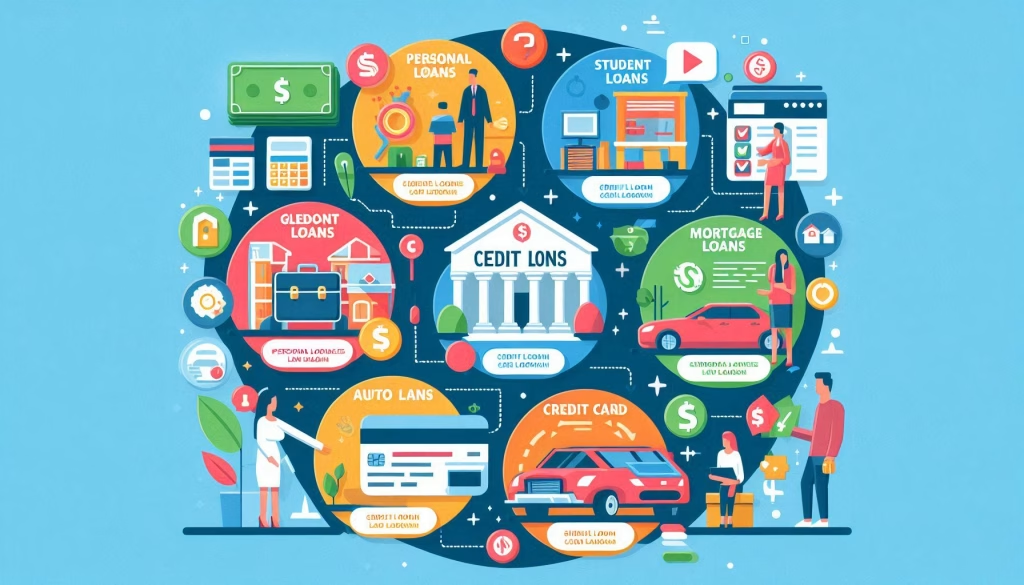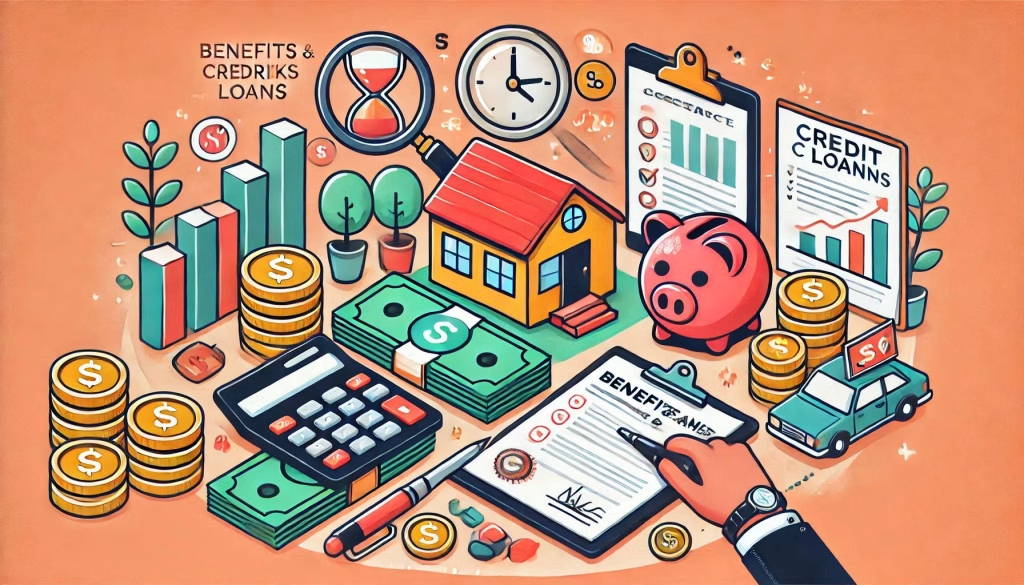Table of Contents
- Overview
- Credit Loan
- Types of Credit Loans
- Credit Loan Tips
- Understand Your Credit Score
- Consider the Purpose and Use of Money
- Shop Around for the Best Rates
- Determine the Sum of Money You Wish to Borrow
- Consider the Total Cost of the Loan
- Selecting the Appropriate Borrowing Option
- Choose the Right Loan Term
- Read the Fine Print
- Maintain a Budget
- Consider Your Debt-to-Income Ratio
- Avoid Taking on Too Much Debt
- Do You Have Investments?
- Plan for the Future
- Seek Professional Advice
- Benefits and Risks Credit loans
- The Conclusion
Overview
Achieving financial stability is not a simple task. This challenge is largely due to the fluctuating nature of an individual’s needs over time.
The rise in living costs without a corresponding increase in monthly income presents a significant challenge. Borrowing may seem like the best solution to maintain a standard of living without experiencing a sense of lack.
Before taking out a credit loan, it’s crucial to consider several factors to ensure it doesn’t lead to financial hardship in the future. The considerations include understanding the annual percentage rate (APR), assessing your credit score, evaluating your budget, calculating the total interest, comparing loan options, and considering any collateral required.
Credit Loan

A credit loan is a financial product that allows individuals to borrow money from a lender with the agreement to repay the borrowed amount, along with interest, over a specified period. Credit loans can be used for various purposes, such as financing major purchases, consolidating debt, covering unexpected expenses, or funding personal projects. Understanding the key aspects of credit loans can help you make informed decisions and manage your finances effectively.
Here are some important points to consider when it comes to credit loans:
Types of Credit Loans

Credit loans come in various forms, each designed to meet different financial needs. Some common types of credit loans include:
Types of Credit Loans No.1
InsuranceWhat.com
Personal Loans
Personal loans are unsecured loans that can be used for a wide range of purposes, such as home improvements, medical expenses, or vacations. Since they are unsecured, personal loans typically have higher interest rates compared to secured loans.
Types of Credit Loans No.2
InsuranceWhat.com
Auto Loans
Auto loans are secured loans specifically designed for purchasing vehicles. The vehicle itself serves as collateral, which means the lender can repossess the car if the borrower fails to make payments. Auto loans usually have lower interest rates due to the collateral.
Types of Credit Loans No.3
InsuranceWhat.com
Home Equity Loans
Home equity loans allow homeowners to borrow against the equity in their homes. These loans are secured by the property and can be used for significant expenses, such as home renovations or debt consolidation. Home equity loans often have lower interest rates but come with the riskRisk Risk is a loss that occurs to the insured individual or object. Various bad possibilities could happen to someone. of losing the home if payments are not made.
Types of Credit Loans No.4
InsuranceWhat.com
Student Loans
Student loans are designed to help students pay for education-related expenses, such as tuition, books, and living costs. These loans can be federal or private, with federal loans typically offering more favorable terms and repayment options.
Types of Credit Loans No.5
InsuranceWhat.com
Credit Card Loans
Credit card loans, also known as cash advances, allow cardholders to borrow money against their credit card limit. These loans usually come with high interest rates and fees, making them a costly option for borrowing.
Credit Loan Tips

Credit loan tips are essential pieces of advice that can help individuals navigate the process of applying for and managing credit loans effectively. These tips are designed to provide guidance on various aspects of credit loans, from understanding credit scores to choosing the right loan terms.
Applying for a credit loan can be a significant financial decision, and it’s essential to approach it with careful consideration and planning. Whether you’re looking to finance a major purchase, consolidate debt, or cover unexpected expenses, understanding the key aspects of credit loans can help you make informed choices.
Here are some valuable tips to guide you through the process of applying for a credit loan:
Credit Loan Tips No.1
InsuranceWhat.com
Understand Your Credit Score
Your credit score plays a crucial role in determining your eligibility for a credit loan and the interest rate you’ll receive. Lenders use your credit score to assess your creditworthiness and the risk of lending to you. A higher credit score typically results in better loan terms, including lower interest rates. Before applying for a loan, check your credit score and review your credit report for any errors or discrepancies. If your score is lower than you’d like, take steps to improve it by paying down debt, making timely payments, and avoiding new credit inquiries.
Credit Loan Tips No.2
InsuranceWhat.com
Consider the Purpose and Use of Money
Initially, consider the purpose or intended use of the funds you wish to borrow. This is crucial as borrowing money can increase your monthly costs and expenses.
You need to spend a few rupiah to repay the loan in installments. If it’s to fulfill needs, it’s wiser to delay the urge to take out a loan.
Ultimately, diligent saving can ensure there is sufficient money for daily needs. However, if the objective is investment, such as purchasing a house, then taking out a loan is often advisable.
Furthermore, house prices are expected to rise consistently. The profit from selling a house should at least cover the monthly loan interest that has been paid.
Credit Loan Tips No.3
InsuranceWhat.com
Shop Around for the Best Rates
Interest rates can vary significantly between lenders, so it’s essential to shop around and compare offers from multiple sources. Look for lenders that offer competitive rates and favorable terms. Consider both traditional banks and online lenders, as online lenders often provide more flexible options and faster approval processes. Use online comparison tools to evaluate different loan offers and choose the one that best fits your financial needs.
Credit Loan Tips No.4
InsuranceWhat.com
Determine the Sum of Money You Wish to Borrow
Once the purpose of the loan is clear, the next step is to determine the amount to apply for, whether it be a small, medium, or large sum. It is crucial to perform precise and detailed calculations to ascertain the exact total loan amount needed.
By making accurate calculations, you can prevent the need for new loans that may increase your installment payments. Additionally, it’s important to consider the interest rate of the loan, as a larger loan will carry a higher interest rate that must be paid.
Credit Loan Tips No.5
InsuranceWhat.com
Consider the Total Cost of the Loan
When evaluating loan offers, it’s important to consider the total cost of the loan, not just the interest rate. This includes any fees and charges associated with the loan, such as origination fees, application fees, and prepayment penalties. Calculate the total amount you’ll repay over the life of the loan, including interest and fees, to get a clear picture of the loan’s cost. This will help you make an informed decision and avoid any surprises down the road.
Credit Loan Tips No.6
InsuranceWhat.com
Selecting the Appropriate Borrowing Option
Currently, numerous financial institutions offer the public a variety of loan types. Therefore, the decision of where to secure a loan rests entirely in your hands.
However, selecting the appropriate loan option is crucial, ensuring it aligns with the borrowing needs and the prevailing interest rates. Banks are one of the alternatives worth considering.
In addition to being safe and reliable, it is also possible to apply for substantial loan amounts. Should your application be declined by a bank, you may consider alternative lending options, such as peer-to-peer (P2P) lending, which can be equally viable. It is advisable to opt for verified options to prevent fraud.
Credit Loan Tips No.7
InsuranceWhat.com
Choose the Right Loan Term
Loan terms can vary from a few months to several years, depending on the type of loan and the lender. Shorter loan terms typically come with higher monthly payments but lower overall interest costs. Conversely, longer loan terms may have lower monthly payments but higher total interest costs. Consider your financial situation and repayment capabilities when choosing a loan term. Opt for a term that allows you to comfortably manage your monthly payments while minimizing the total cost of the loan.
Credit Loan Tips No.8
InsuranceWhat.com
Read the Fine Print
Before signing any loan agreement, carefully read the fine print and understand all the terms and conditions. Pay attention to details such as interest rates, repayment schedules, fees, and any penalties for late payments or early repayment. Make sure you fully understand your obligations and the lender’s policiesPolicy The policy is a binding agreement and is agreed upon by the insurance company and policyholder in writing. An agreement made by the policyholder with an insurance company.. If you have any questions or concerns, don’t hesitate to ask the lender for clarification.
Credit Loan Tips No.9
InsuranceWhat.com
Maintain a Budget
Creating and maintaining a budget is essential when taking out a credit loan. A budget helps you manage your finances, track your expenses, and ensure that you can make your loan payments on time. Include your loan payments in your monthly budget and prioritize them alongside other essential expenses. By staying organized and disciplined with your budget, you can avoid missed payments and potential financial difficulties.
Credit Loan Tips No.10
InsuranceWhat.com
Consider Your Debt-to-Income Ratio
Lenders often consider your debt-to-income (DTI) ratio when evaluating your loan application. Your DTI ratio is the percentage of your monthly income that goes toward paying debts. A lower DTI ratio indicates that you have a manageable level of debt relative to your income, which can improve your chances of loan approval. Aim to keep your DTI ratio below 36%, and if it’s higher, consider paying down existing debts before applying for a new loan.
Credit Loan Tips No.11
InsuranceWhat.com
Avoid Taking on Too Much Debt
While credit loans can be helpful in managing your finances, it’s important to avoid taking on more debt than you can handle. Borrow only what you need and can comfortably repay. Taking on excessive debt can lead to financial stress and difficulty making payments, which can negatively impact your credit score and overall financial health. Be mindful of your borrowing limits and make responsible financial decisions.
Credit Loan Tips No.12
InsuranceWhat.com
Do You Have Investments?
While investments are meant for future gains, it is not incorrect to withdraw some funds to satisfy your current needs. This approach certainly has its own set of pros and cons.
The benefit is that there’s no need to worry about monthly installments and interest. However, it requires being prepared to part with some of the assets accumulated over time.
Similarly, the profits that might be gained from the invested amount should be considered. Therefore, it is important to carefully evaluate these two factors before deciding to apply for a loan from creditors.
Credit Loan Tips No.13
InsuranceWhat.com
Plan for the Future
When taking out a credit loan, consider your long-term financial goals and how the loan fits into your overall financial plan. Think about how the loan will impact your future finances and whether it aligns with your goals, such as saving for retirement, buying a home, or starting a business. By planning for the future, you can make more informed decisions and ensure that the loan supports your financial objectives.
Credit Loan Tips No.14
InsuranceWhat.com
Seek Professional Advice
If you’re unsure about any aspect of the credit loan process, consider seeking advice from a financial professional. A financial advisor or credit counselor can provide valuable insights and help you navigate the complexities of borrowing. They can assist you in evaluating loan offers, understanding your financial situation, and making informed decisions that align with your goals.
It’s fortunate to have well-maintained relationships with family, friends, or colleagues. In times of financial hardship, these connections can be a source of support before one considers involving creditors in financial affairs.
Be transparent about your current financial situation to inspire their empathy and assistance. Remember, a debt remains an obligation.
Ensure that you pay the installments regularly as per the initial agreement. Avoid any delays in payment, as maintaining a positive relationship with the stakeholders is crucial.
Benefits and RisksRisk Risk is a loss that occurs to the insured individual or object. Various bad possibilities could happen to someone. Credit loans

Credit loans offer several benefits, including:
- Access to Funds: Credit loans provide access to funds that can be used for various purposes, such as making large purchases, consolidating debt, or covering emergency expenses.
- Building Credit: Successfully managing a credit loan by making timely payments can help improve your credit score and build a positive credit history.
- Flexible Use: Many credit loans, especially personal loans, offer flexibility in how the borrowed funds can be used, allowing borrowers to address their specific financial needs.
However, credit loans also come with risks, including:
- Debt Accumulation: Taking on too much debt can lead to financial stress and difficulty making payments, which can negatively impact your credit score and overall financial health.
- Interest Costs: The cost of borrowing, including interest and fees, can add up over time, making the loan more expensive than initially anticipated.
- Collateral Risk: For secured loans, such as auto loans and home equity loans, failing to make payments can result in the loss of the collateral, such as your car or home.
The Conclusion
Applying for a Loan Necessitates Meticulous Deliberation
Borrowing money should not be done impulsively but with careful thought. This ensures that the loan improves rather than worsens your financial situation, providing a benefit that helps you manage in the days to come.
Credit loans can be a valuable financial tool when used responsibly. By understanding the different types of credit loans, interest rates, fees, credit score requirements, loan terms, and repayment options, you can make informed decisions that align with your financial goals. Always consider the benefits and risks associated with credit loans and choose a loan that fits your needs and budget. With careful planning and management, credit loans can help you achieve your financial objectives and improve your overall financial well-being.
By following these credit loan tips, you can make informed decisions and secure a loan that meets your financial needs. Remember to approach the process with careful consideration, research, and planning to ensure a positive borrowing experience and long-term financial success.
Do you think you have other ideas about Credit Loan Tips: 14 Essential Factors to Consider Before Applying? You can comment and share your thoughts below, or discuss more in the InsuranceWhat Forum. Also, read more articles about GLOBAL INSURANCE or other interesting insurance topic articles only at InsuranceWhat.com.




